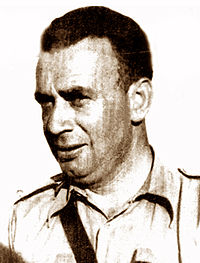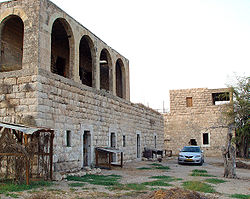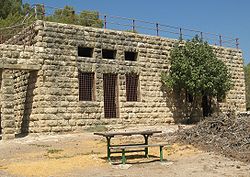
Meir Tobianski
Encyclopedia


Israel Defense Forces
The Israel Defense Forces , commonly known in Israel by the Hebrew acronym Tzahal , are the military forces of the State of Israel. They consist of the ground forces, air force and navy. It is the sole military wing of the Israeli security forces, and has no civilian jurisdiction within Israel...
(IDF) who was executed as a traitor on circumstantial evidence on the orders of Isser Be'eri
Isser Be'eri
Isser Be'eri was the director of the Haganah Intelligence Service in Israel and was responsible for helping to reorganise Israeli intelligence services in 1948, as well as knowingly ordering the execution of an innocent man, Meir Tobianski...
, the first director of the IDF's intelligence branch. A year after the execution, Tobianski was exonerated of all charges.
Tobianski was a major in the British army during the Second World War
World War II
World War II, or the Second World War , was a global conflict lasting from 1939 to 1945, involving most of the world's nations—including all of the great powers—eventually forming two opposing military alliances: the Allies and the Axis...
, then a captain in the Haganah
Haganah
Haganah was a Jewish paramilitary organization in what was then the British Mandate of Palestine from 1920 to 1948, which later became the core of the Israel Defense Forces.- Origins :...
, and was later sworn in to the IDF on 28 June 1948, during the 1948 Arab-Israeli War
1948 Arab-Israeli War
The 1948 Arab–Israeli War, known to Israelis as the War of Independence or War of Liberation The war commenced after the termination of the British Mandate for Palestine and the creation of an independent Israel at midnight on 14 May 1948 when, following a period of civil war, Arab armies invaded...
. He was also the former commander of Camp Schneller
Schneller Orphanage
Schneller Orphanage was a Christian orphanage that operated in Jerusalem from 1860 until World War II. The orphanage grounds, located on Malchei Yisrael Street in central Jerusalem, became a British military base known as Camp Schneller. After 1948, the compound housed offices of the Israel...
, a military base in Jerusalem. In June 1948 Tobianski had been transferred to command of Jerusalem airstrips. He was an employee of the British-run Jerusalem Electric Corporation. Suspected of passing information of targets for Jordanian artillery, he was taken into custody and sentenced to death by firing squad in a drumhead court-martial
Drumhead court-martial
A drumhead court-martial is a court-martial held in the field to hear urgent charges of offences committed in action. The term is said to originate from the use of a drumhead as an improvised writing table, altar for religious services, and a traditional gathering point for a regiment for orders...
.
Spy fever
During the siege of JerusalemSiege of Jerusalem (1948)
The Battle for Jerusalem occurred from 30 November 1947 to 11 June 1948 when Jewish and Arab population of Mandatory Palestine and later Israeli and Jordanian armies fought for the control of the city....
, the reports and fears of spies abounded. Lehi
Lehi (group)
Lehi , commonly referred to in English as the Stern Group or Stern Gang, was a militant Zionist group founded by Avraham Stern in the British Mandate of Palestine...
alone had executed 4 "spies" in Jerusalem including Vera Ducas
Vera Ducas
Vera Ducas was born to a Jewish family in Austria-Hungary/Czechoslovakia. She fled the 1939 Nazi invasion with her husband and child. They lived in Turkey for several years before arriving in Palestine...
, a 36-year-old female Austrian Jew who was shot on 29 March. In June, there was a report that "nine Jewish girls are being held by the Army under suspicion of contacts with the enemy." The apparent accuracy of Jordanian shelling of strategic targets led to suspicions that a spy was responsible. Those suspicions were focused on the Jerusalem Electric Corporation.
On 8 July 1948, the Irgun
Irgun
The Irgun , or Irgun Zevai Leumi to give it its full title , was a Zionist paramilitary group that operated in Mandate Palestine between 1931 and 1948. It was an offshoot of the earlier and larger Jewish paramilitary organization haHaganah...
kidnapped five British officials of the Jerusalem Electric Corporation
Israel Electric Corporation
Israel Electric Corporation is the main supplier of electrical power in Israel.IEC builds, maintains and operates power generation stations, sub-stations, as well as the transmission and distribution networks....
. One of the men was Michael Bryant, to whom Tobianski had been accused of passing information. A month later, they were transferred to the Israeli authorities and on 12 August brought to trial. Three, including Bryant, were released due to lack of evidence. The remaining two men, George Hawkins and Fredrick Sylvester, faced a second trial on 16 September. Hawkins, who was charged with passing information to the Arabs, was released on 30 September. Sylvester, who was married to a Palestinian Jew and had been a member of the Palestine Police, was charged with espionage and complicity in the Ben Yehuda Street bombing. On 6 October, he was found guilty of three charges of espionage and sentenced to seven years in prison. The verdict rested on his possession of a radio with which he had been communicating with the British Consul in the Old City.
Trial and execution

After arriving at Tel Aviv
Tel Aviv
Tel Aviv , officially Tel Aviv-Yafo , is the second most populous city in Israel, with a population of 404,400 on a land area of . The city is located on the Israeli Mediterranean coastline in west-central Israel. It is the largest and most populous city in the metropolitan area of Gush Dan, with...
on 30 June 1948, Tobianski was taken into custody by Shmuel Granizi in the Carmel market. Contrary to the Chief Military Persecutor's order to arrest and interrogate Tobianski for 10 days, Tobianski was driven from Tel Aviv
Tel Aviv
Tel Aviv , officially Tel Aviv-Yafo , is the second most populous city in Israel, with a population of 404,400 on a land area of . The city is located on the Israeli Mediterranean coastline in west-central Israel. It is the largest and most populous city in the metropolitan area of Gush Dan, with...
to Hulda and then onto a deserted school building between the former Arab villages of Bayt Susin
Bayt Susin
Bayt Susin was a Palestinian Arab village in Mandatory Palestine, located southeast of Ramla. In 1945, it had 210 inhabitants. The village was depopulated during the 1948 war by the Israeli 7th Brigade.-Geography:...
and Bayt Jiz
Bayt Jiz
Bayt Jiz was a Palestinian Arab village situated on undulating land in the western foothills of the Jerusalem heights, southwest of Ramla. In 1945, it had a population of 550...
, where he was subject to a drumhead court-martial
Drumhead court-martial
A drumhead court-martial is a court-martial held in the field to hear urgent charges of offences committed in action. The term is said to originate from the use of a drumhead as an improvised writing table, altar for religious services, and a traditional gathering point for a regiment for orders...
. During the court martial, Tobianski was interrogated by Isser Be'eri
Isser Be'eri
Isser Be'eri was the director of the Haganah Intelligence Service in Israel and was responsible for helping to reorganise Israeli intelligence services in 1948, as well as knowingly ordering the execution of an innocent man, Meir Tobianski...
, David Kron, Binyamin Gibli
Binyamin Gibli
Binyamin Gibli was the head of Israeli Military Intelligence from June 1950 to March 1955. Gibli was forced to resign in the wake of the Lavon Affair, a failed Israeli operation in Egypt in 1954.-Biography:...
and Avraham Kidron. He admitted to showing a list of the consumers to Michael Bryant, British manager of the Jewish section of the Jerusalem Electric Corporation, although the list 'vanished'.
Be'eri, who was late for the trial, had already prepared a firing squad of six soldiers from the Palmach
Palmach
The Palmach was the elite fighting force of the Haganah, the underground army of the Yishuv during the period of the British Mandate of Palestine. The Palmach was established on May 15, 1941...
Yiftach Brigade
Yiftach Brigade
The Yiftach Brigade was an Israeli infantry brigade...
, which was in control of the Jerusalem corridor zone.
Tobianski was found guilty and executed in Bayt Jiz, where his body was buried. He had received neither a lawyer nor the right to appeal, and his case was not reviewed by a higher court. The execution led directly to the ascension of Isser Harel
Isser Harel
Isser Harel was spymaster of the intelligence and the security services of Israel and the Director of the Mossad . In his capacity as Mossad director he oversaw the abduction, and secret transport to Israel, of Holocaust organizer Adolph Eichmann....
, the man most responsible for forming the Israeli Mossad
Mossad
The Mossad , short for HaMossad leModi'in uleTafkidim Meyuchadim , is the national intelligence agency of Israel....
.
Investigation and acquittal
Several months later, an Israeli ArabArab citizens of Israel
Arab citizens of Israel refers to citizens of Israel who are not Jewish, and whose cultural and linguistic heritage or ethnic identity is Arab....
by the name of Ali Qasim, who had spied for the Israeli intelligence, was found dead in a forest near Haifa
Haifa
Haifa is the largest city in northern Israel, and the third-largest city in the country, with a population of over 268,000. Another 300,000 people live in towns directly adjacent to the city including the cities of the Krayot, as well as, Tirat Carmel, Daliyat al-Karmel and Nesher...
. Be'eri was suspected of ordering his execution, on suspicion of being a double agent
Double agent
A double agent, commonly abbreviated referral of double secret agent, is a counterintelligence term used to designate an employee of a secret service or organization, whose primary aim is to spy on the target organization, but who in fact is a member of that same target organization oneself. They...
. Be'eri admitted to the charges in court and was dismissed from his lucrative post in the Israel Defense Forces. Due to the efforts of Tobianski's wife, the Military Advocate General
Military Advocate General
The Military Advocate General assists the Israel Defense Forces in imposing rules of conduct through legal advice, legal instruction, maintaining the mechanisms for military prosecution and legal defense, and fulfilling special legal tasks...
ordered Tobianski's case to be attached to this investigation, led by the Military Advocate General
Military Advocate General
The Military Advocate General assists the Israel Defense Forces in imposing rules of conduct through legal advice, legal instruction, maintaining the mechanisms for military prosecution and legal defense, and fulfilling special legal tasks...
Aharon Hoter-Yishai; Tobianski was exonerated by the inquiry.
Among the interrogated was Avraham Gorali, the chief military prosecutor at the time, who claimed that the execution was done without his knowledge. However, the chief military police officer, Danny Magen, stated that Gorali contacted him by phone one day before the execution and asked about the possibility of the Military Police Corps carrying out the punishment, which Magen refused. Gorali admitted to such a call, but the investigation's report stated that this was likely an attempt to assess the possibility of carrying out a death sentence in the IDF, and did not imply knowledge of the outcome of the trial.
On 1 July 1949, a year after the trial, a note was sent to Tobianski's wife, informing her of the acquittal, and the posthumous reinstatement of rank to Tobianski. On 5 July, Ben-Gurion
David Ben-Gurion
' was the first Prime Minister of Israel.Ben-Gurion's passion for Zionism, which began early in life, led him to become a major Zionist leader and Executive Head of the World Zionist Organization in 1946...
issued a public exoneration of Tobianski and on 7 July, his body was reburied in a military ceremony in the IDF's burial grounds on Mount Herzl
Mount Herzl
Mount Herzl , also Har HaZikaron , is the national cemetery of Israel on the west side of Jerusalem. It is named for Theodor Herzl, the founder of modern political Zionism. Herzl's tomb lies at the top of the hill. Yad Vashem, which commemorates the Holocaust, lies to the west of Mt. Herzl....
. Ben Gurion excused Be'eri's actions..."perhaps because the underground laws were still dominant in the army". Nathan Alterman
Nathan Alterman
Nathan Alterman was an Israeli poet, playwright, journalist, and translator who – though never holding any elected office – was highly influential in Socialist Zionist politics, both before and after the establishment of the State of Israel.-Biography:...
wrote a poem commemorating Tobianski and his trial.
Be'eri's trial
Isser Be'eri was tried and found guilty of manslaughterManslaughter
Manslaughter is a legal term for the killing of a human being, in a manner considered by law as less culpable than murder. The distinction between murder and manslaughter is said to have first been made by the Ancient Athenian lawmaker Dracon in the 7th century BC.The law generally differentiates...
. The court found that, as there was a ceasefire in effect at the time, any information supposedly passed by Tobianski could not have served the Jordanian artillery. Be'eri received only one day of prison time due to his extensive service to the country. Even though pardoned on the same day by the president, Chaim Weizmann
Chaim Weizmann
Chaim Azriel Weizmann, , was a Zionist leader, President of the Zionist Organization, and the first President of the State of Israel. He was elected on 1 February 1949, and served until his death in 1952....
, Be'eri left the trial a broken man, and ensconced himself in his home until his fatal heart attack in January 1958. The other three interrogators and makeshift judges who tried Tobianski were not tried in court, and reached high military and civilian positions. In his book, David Kron wrote that despite the official investigation, he was convinced that Tobianski had been guilty and that Be'eri had the full authority to act the way he had. Meanwhile, Shabtai Teveth
Shabtai Teveth
Shabtai Teveth , is an Israeli historian.Shabtai Teveth began working as a journalist for Haaretz newspaper in 1950, eventually becoming its political correspondent...
found that the fault lay with Gibli's overbearing ambitions and manipulation, personal traits that led to the Lavon affair
Lavon Affair
The Lavon Affair refers to a failed Israeli covert operation, code named Operation Susannah, conducted in Egypt in the Summer of 1954. As part of the false flag operation, a group of Egyptian Jews were recruited by Israeli military intelligence for plans to plant bombs inside Egyptian, American and...
.
Further reading
- Google Books Uri Bar-Joseph Intelligence Intervention in the Politics of Democratic States: The United States Israel and Britain... Penn State Press, ISBN 0271025751 by Dennis Eisenberg, Uri Dan, and Eli Landau, Copyright Oct. 1, 1979.

